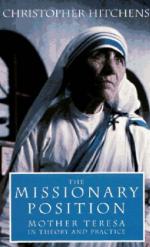
|
| Name: _________________________ | Period: ___________________ |
This test consists of 15 multiple choice questions and 5 short answer questions.
Multiple Choice Questions
1. What was Mother Teresa's benefactor's sentence for his part in the Savings and Loan scandal?
(a) Ten years in prison.
(b) Twenty years in prison.
(c) Fifteen years in prison.
(d) Five years in prison.
2. Chapter 2 in "Good Works and Heroic Virtues" the author contends that a clear correlation can be found between the limitation of family _____ and the life chances of the family members.
(a) Abuse.
(b) Income.
(c) Worship.
(d) Size.
3. What prize did Prince Philip award to Mother Teresa in 1973?
(a) Nobel Peace Prize.
(b) Templeton prize.
(c) Good Samaritan award.
(d) Winston Churchill award.
4. Who wrote the short story, "The Free Radio" in East, West?
(a) Emily Lewis.
(b) Christopher Hitchens.
(c) Salman Rushdie.
(d) Susan Shields.
5. What did Mother Teresa wear when the Vatican awarded her the John XXIII Prize for Peace in 1971?
(a) A medical armband.
(b) An Indian sari.
(c) Her traditional nun's habit.
(d) A rosary of wooden beads.
6. Who, according to the second chapter of "Good Works & Heroic Virtues," are the Catholic Church's official dogmas mainly derived from?
(a) St. Peter.
(b) St. Paul.
(c) Jesus.
(d) St. Jude.
7. When awarded with the Nobel Peace Prize, what reason did Mother Teresa give to explain why many young people in the West were on drugs?
(a) Their families don't care for them.
(b) There isn't enough charity.
(c) They are not close enough to God.
(d) They have little understanding of real work.
8. In what city did Mother Teresa accept the Good Samaritan award?
(a) Washington D.C.
(b) Calcutta.
(c) Boston.
(d) Rome.
9. Which award did Mother Teresa receive in Washington D.C. in October 16, 1971?
(a) Templeton prize.
(b) Nobel Peace Prize.
(c) Good Samaritan award.
(d) John F. Kennedy award.
10. What country has to seek an accommodation for its huge Protestant-majority province?
(a) Albania.
(b) Bangladesh.
(c) India.
(d) Ireland.
11. Who says, in the Afterword, that he began judging Mother Teresa's reputation by her actions and words rather than her actions and words by her reputation?
(a) Christopher Hitchens.
(b) Charlie Rose.
(c) Ralph Reed.
(d) Lush Gjergji.
12. How many orphans did Mother Teresa rescue from the Bangladesh calamity?
(a) 3-4 dozen.
(b) 28-35.
(c) Just under 100.
(d) 4-5 dozen.
13. Which group awarded Mother Teresa with a medallion inscribed with, "Food For All: Holy Year 1975"?
(a) The United States government.
(b) The Indian government.
(c) The United Nations Food and Agriculture Organization.
(d) The Vatican.
14. Where was the Ann Lander's comment quoting Mother Teresa as saying, "They should smile more," sent from?
(a) Clarksville, Tennessee.
(b) Dublin, Ireland.
(c) Prince George, British Columbia.
(d) Boston, Massachusetts.
15. What prize from the Phillippines government did Mother Teresa win along with a much needed $50,000 rupees?
(a) International Balzan Prize.
(b) Magsaysay Prize.
(c) Prize of the Miraculous Lotus.
(d) The Ceres Award.
Short Answer Questions
1. What amount did Mother Teresa receive with her award from Prince Philip?
2. Which words will have no literal meaning in the future of the People's Republic of China, according to Chapter 2 of "Good Works and Heroic Virtues?"
3. In Judaism, what is a woman experiencing danger in childbirth supposed to do?
4. In an interview with Malcolm Muggeridge, what did Mother Teresa say she could not do because of her vow to the poor?
5. When was Mother Teresa awarded the Nobel Peace Prize?
|
This section contains 536 words (approx. 2 pages at 300 words per page) |

|




